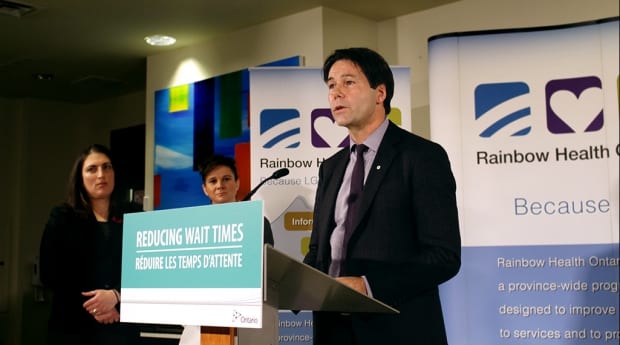The Ontario government plans to smash the Centre for Addiction and Mental Health bottleneck for trans people who need sex-reassignment surgery.
Minister of Health Eric Hoskins announced on Nov 6, 2015, that the government will allow healthcare providers from across the province to conduct initial assessments. Currently, any trans person who wants to get approval from OHIP to cover a surgery must endure years-long wait times and travel to CAMH in Toronto.
“We will be moving from what is currently a single site to potentially what could be hundred and hundreds of sites,” Hoskins said at the press conference held in the Sherbourne Health Centre.
In order to make the assessments, health care providers will first have to receive some level of training, but Hoskins did not provide specifics as to who the government believes will be qualified to make these decisions.
The government will also provide increased funding to CAMH in the short-term in order to alleviate the over 1,000 person wait-list, and to Rainbow Health Ontario, an initiative that has trained around doctors in providing care to trans patients. Hoskins said that the level of funding will be made public at a later date.
However, the changes announced by the government only affect the first step in a very long process for trans people who need sex-reassignment surgery, a reality that Hoskins acknowledged.
“I recognize as well that this is only a first step in our government’s work to strengthen health supports for the trans community,” he said.
There are currently no surgeons in Ontario that actually perform sex-reassignment surgeries. Instead, patients must go out of province, generally to Quebec or the United States.
“That’s where the system could get seriously bogged down with serious wait-lists unless we act now,” Cheri DiNovo, NDP MPP for Parkdale-High Park, tells reporters.
“Me and my office have had suicide calls from trans folk who are on those wait lists,” she says. “And remember that’s just for the first initial assessment, that’s not for the surgical procedures. You could wait years after that.”
France Gélinas, the MPP for Nickel Belt and the NDP’s health critic, tells Daily Xtra that while she supports the changes, the government’s announcement still leaves many questions unanswered.
She argues that the public still doesn’t know if there will be enough health care professionals outside of the Greater Toronto Area who will have proper training to do assessments.
“Where are they located? And even if they have the training, in what kind of an environment do they work? Because if all they do is walk-ins, well that’s not an environment that you can undertake the care for a trans person,” she says.
“I would have much preferred them to say that this service will be available in every community health centre in our province.”
According to DiNovo, much more needs to be done to address the issue of trans healthcare.
“This really is a crisis,” she says. “It’s a crisis in trans health, it’s a crisis in public health and we have to step forward.”

 Why you can trust Xtra
Why you can trust Xtra


